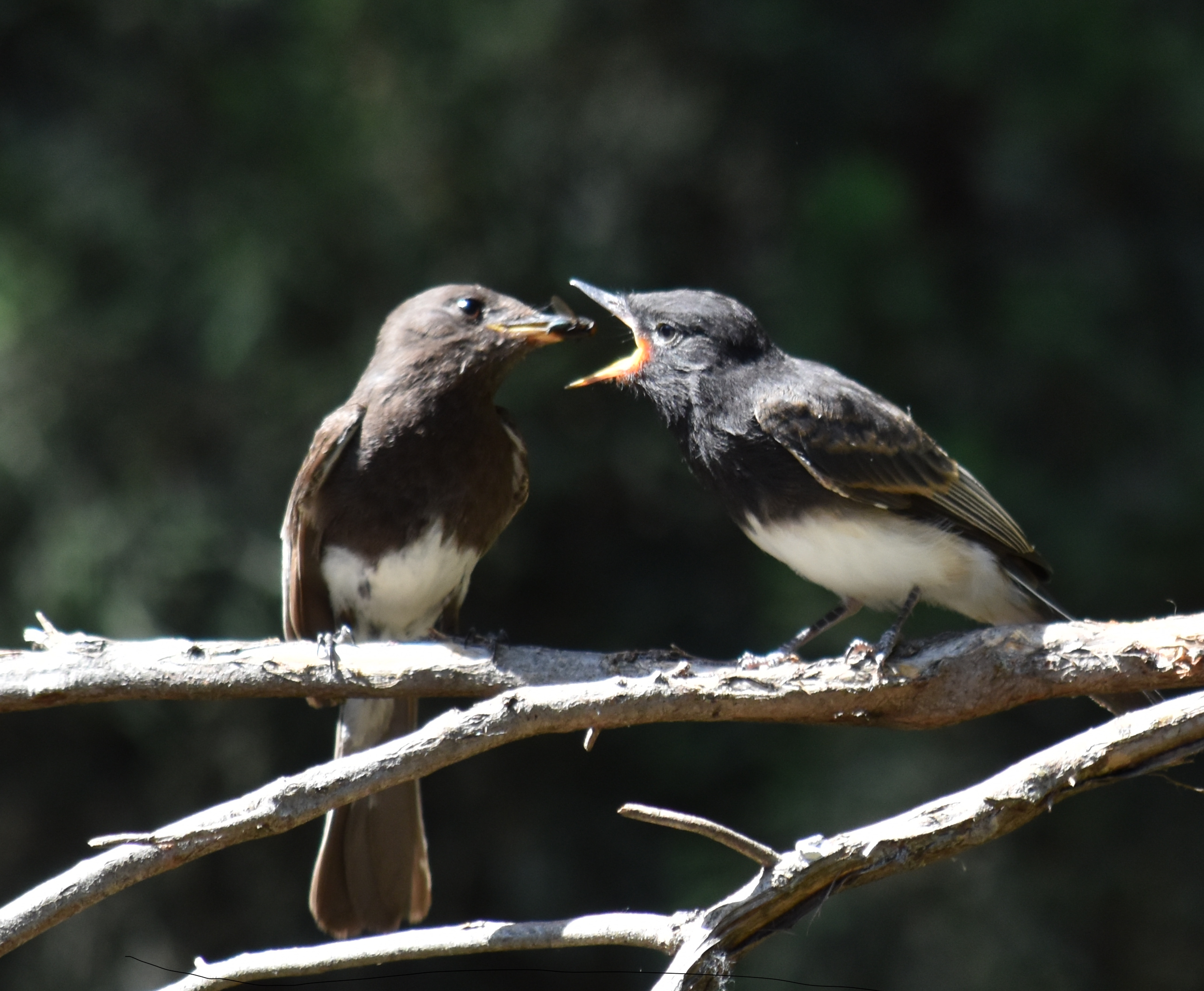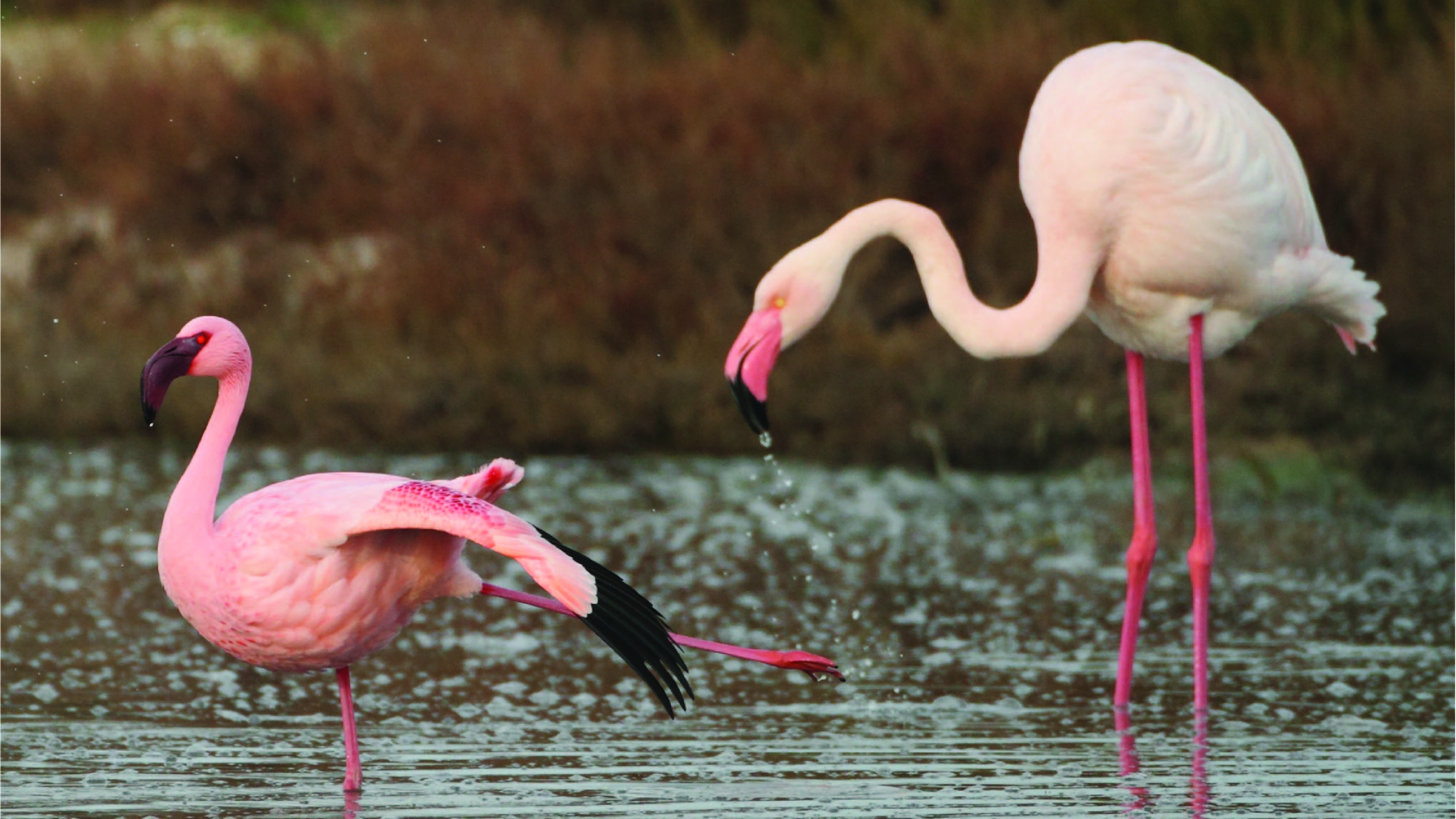
PROGRAM DESCRIPTION
The public is invited to join the Yolo Bird Alliance at its January 15 virtual program meeting featuring “Phoebes & Flamingos”. The program is via Zoom and runs from 6:30 to 8:30 pm on January 15. Participants must register with Zoom, at no cost, in advance for this meeting. This meeting will feature two speakers, Finn Velisaris & Christopher Torres, PhD and will start at 6:30 pm.

Black Phoebes ©Kelli O’Neill
Project Phoebe: How Do Songbird Nest Predator Communities and Predation Rates Change Across an Urban Gradient?
At 6:30 pm, recent UC Davis grad and Yolo Bird Alliance Small Grant recipient, Finn Velisaris, will speak about his independent project, “How do Songbird Nest Predator Communities and Predation Rates Change Across an Urban Gradient?” This project was conducted within the larger effort, Project Phoebe, a research effort led by three graduate students in the Patricelli and Hahn labs at UC Davis. Finn will first introduce you to Project Phoebe and its main goals before getting into the meat of his talk, his independent project conducted during his time with Project Phoebe. Finn’s project focused on predators of the Black Phoebe’s eggs and nestlings, and how their community composition and the rate at which they predate Phoebe nests might be affected by the level of urbanization. Above all, Finn hopes to present on the unique challenges that the Black Phoebe faces as an urban-living species, as well as foster an appreciation for these tactful Tyrannids (flycatchers).
SPEAKER BIO:
Finn Velisaris is a recent graduate of UC Davis with a degree in Wildlife, Fish, and Conservation Biology. Throughout his academic career, Finn contributed to a variety of research projects, including work in the Patricelli and Hahn Labs on extra-pair copulation in white-crowned sparrows and effects of urbanization on the Black Phoebe, and work in the Furrow Lab on using nocturnal flight calls to track migration As an avid birder with a passion for songbird ecology, his current research investigates how predation rates and songbird communities shift across the urban gradient.
The Evolution of the Flamingo’s Smile

Flamingo ©Christopher Torres
At 7:00 pm, Christopher Torres, PhD, Assistant Professor in the Dept. of Biological Sciences at the University of the Pacific, will talk about “The Evolution of the Flamingo’s Smile”. Flamingos are among the most iconic birds on the planet – with their ostentatious coloration and perpetually inverted smile, it’s easy to understand why they are featured in zoos (and front yards) the world over. Flamingos are also among the world’s most highly specialized birds, employing an approach to filter-feeding utterly unlike anything else. As such, flamingos provide an ideal model system for studying what drives the evolution of beak shape, what drives birds to become increasingly specialized at the ever-increasing risk of extinction, and how those shifts in ecology and morphology correspond to shifts in Earth history. But flamingo evolutionary history remains shrouded in mystery, being marked by enigmatic origins, cryptic fossils, and repeated brushes with extinction. In this talk, Chris will share current understanding of that history, and will tell several tales about how he and his colleagues are seeking to dispel many of those mysteries, including: How, after two centuries of study, it was only relatively recently discovered that grebes are the closest living relatives of flamingos. How the understanding of what came before flamingos and grebes remains poor, despite the existence of a nearly complete fossil documenting that exact moment in evolutionary time. How a lineage of bizarre, prehistoric ‘straight-beaked flamingos’ managed to achieve a near-global distribution… and then vanished from the fossil record. How the ancestors of modern, ‘curved-beaked flamingos’ nearly met the same fate… before spreading back out across the globe. How California – along with the rest of North America’s West Coast – was covered in flamingos as recently as a few tens of thousands of years ago. How baby flamingos undergo one of the most unique post-hatching changes in beak morphology known among birds. And how watching those baby flamingos grow up might provide insights to the earliest stages of flamingo evolution.
SPEAKER BIO
Christopher Torres is a bird paleontologist whose research focuses on questions about the evolution of the skull and brain, the evolution of bird ecology, and what influences extinction. His projects involve studying various groups of birds (like flamingos, ratites and relatives, rails, and early prehistoric birds) from various slices of time in Earth’s history.
This event is free, and you do not need to be a member of Yolo Bird Alliance. To learn more about the Yolo Bird Alliance, visit its web page at https://yolobirdalliance.org/. You can also visit the Yolo Bird Alliance on Facebook – https://www.facebook.com/YoloBirdAlliance. If you would like to join and receive the monthly newsletter, visit https://yolobirdalliance.org/join-renew-donate/.
DETAILS ON JOINING THIS ZOOM MEETING
You must register (no cost) – https://us02web.zoom.us/meeting/register/tZYpdeCsrTkjH9bkfq3z02FNdOiORZ_58sPA – in advance for this meeting. An account with Zoom is NOT necessary to join a meeting. Zoom limits the number of participants to 100. After registering, you will receive a confirmation email containing information about joining the meeting. Registrants will receive email updates about this online event, as well as periodic email updates about Yolo Bird Alliance’s conservation work and how you can help birds. (You can unsubscribe at any time.)
Please note: Participants must have the Zoom desktop client downloaded on their computer or on their Apple or Android mobile phone or tablet to access the meeting.
Visit https://bit.ly/3hNyP8h to learn how to join a Zoom meeting. You may email Yolo Bird Alliance Program Chair Ken Ealy before the meeting if you need assistance.